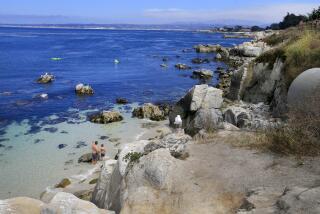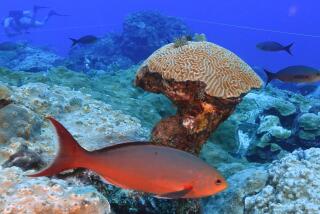Channel Islands Marine Reserve Would Help Fishermen and Fish
- Share via
I strongly support protection of our oceanic resources and fisheries by placing at least 40% to 50% of the Channel Islands National Marine Sanctuary into a marine reserve system.
Such an action is being contemplated by the sanctuary managers and has been recommended by a panel of 17 renowned marine scientists who reviewed more than 150 scientific studies before making their recommendation.
These marine reserves must be established soon because local fisheries have dwindled to the point where species such as the white abalone and the giant sea bass, once harvested extensively near the Channel Islands, are being considered for listing as endangered by the government.
Other once-common species including lingcod, cowcod, bocaccio and various rockfish have been placed on the American Fisheries Society’s list of species in danger of extinction. The American Fisheries Society is a professional group for biologists.
The unfortunate history of the fishing industry has been to exploit a species until it becomes too scarce to be economically harvested and then to move on to the next most economically valuable species. This is not sustainable, and unless marine reserves are established in the sanctuary, the fishing industry as well as the irreplaceable marine ecosystem are in serious jeopardy.
*
Quotas set by the California Department of Fish and Game are too high to prevent this radical decline of fish. Inside the small Anacapa Island Marine Reserve, there are 12 times as many kelp bass and 15 times as many sheephead as in adjacent waters that are fished. Inside the reserve, there are more and bigger lobsters than outside.
Marine reserves are the only way to keep fishermen in business over a much longer term than the current trends point to, and to protect the biological diversity that is the foundation of the marine ecosystem and that ultimately supports life on Earth. Some farseeing area fishermen and conservationists have joined together in support of large marine reserves. Other fishermen, many from outside of the area, prioritize short-term economic gain over long-term economic and environmental sustainability.
Fish and Game and the Channel Islands Marine Sanctuary Advisory Council should embrace the scientists’ recommendations to prevent extinction while ensuring that fisheries are available for commercial and recreational harvests for many generations to come.
*
As one businessman who has for years ferried divers out to the islands puts it, the lush kelp forests and underwater reefs that once burst with color and life have become barren, shriveled-up graveyards. This is a serious situation we face, and unless we want to be scolded post-mortem by our great-grandchildren, we will declare at least 40% to 50% of the sanctuary as marine reserves.
More to Read
Sign up for Essential California
The most important California stories and recommendations in your inbox every morning.
You may occasionally receive promotional content from the Los Angeles Times.













